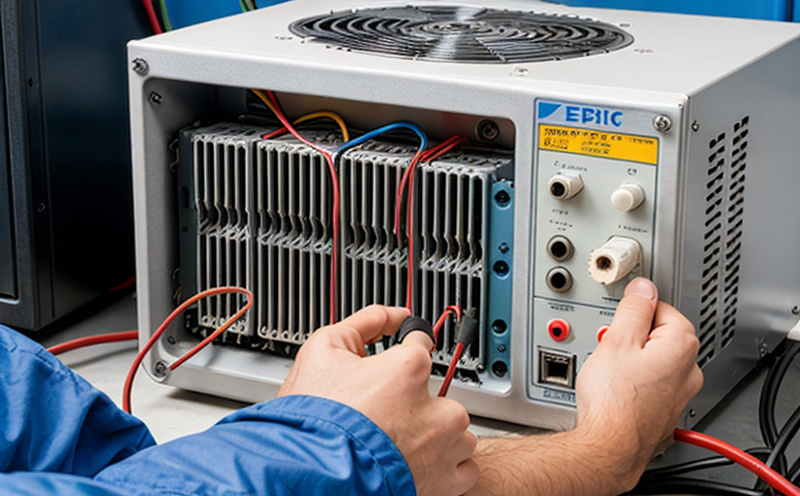IEC 62477 Safety Testing of Marine Power Electronics
The International Electrotechnical Commission (IEC) standard IEC 62477-1, titled “Electrical and electronic equipment for use on board ships and similar vessels – Part 1: General requirements,” is a critical document that sets the foundation for ensuring the safety of electrical and power systems used in marine environments. This standard addresses the unique challenges posed by saltwater, vibration, and mechanical stress encountered during maritime operations.
IEC 62477-1 specifically focuses on the design, construction, and operation of electrical and electronic equipment to be used on board ships, including power electronics such as inverters, converters, and controllers. The standard ensures that these components meet stringent safety requirements designed to prevent accidents, malfunctions, or failures that could compromise crew safety and vessel integrity.
Testing according to IEC 62477-1 involves a series of rigorous evaluations aimed at assessing the robustness and reliability of marine power electronics. These tests are conducted in controlled laboratory environments where specimens undergo various stressors that mimic real-world conditions encountered during maritime operations. The testing process includes:
- Electrical load testing to ensure components can handle expected current demands.
- Vibration testing to simulate the effects of ship movement on equipment.
- Environmental exposure tests, including saltwater immersion and humidity tests to assess corrosion resistance.
- Thermal cycling tests to evaluate performance under varying temperature conditions.
The results of these tests provide assurance that marine power electronics are safe for use in harsh marine environments. Compliance with IEC 62477-1 is essential for manufacturers, ensuring their products meet international safety and quality standards. For users of such equipment, compliance indicates reliability and trustworthiness.
The testing process ensures that electrical and electronic equipment used on board ships meets the highest level of safety and performance. This includes:
- Enhanced crew safety by preventing potential malfunctions or failures that could lead to accidents.
- Avoidance of vessel damage due to component failure, which can result in costly repairs and delays.
- Extended equipment lifespan through the use of robust materials and designs that withstand harsh marine conditions.
The IEC 62477-1 safety testing process is not only crucial for new product development but also essential during the maintenance and repair phases. Regular testing ensures that existing equipment continues to meet safety standards, thereby extending its operational lifespan and reducing downtime.
Compliance with this standard is a mandatory requirement in many parts of the world, particularly those with stringent maritime regulations. For manufacturers seeking to enter these markets or gain competitive advantage, compliance with IEC 62477-1 is not just beneficial—it’s essential.
In summary, IEC 62477-1 safety testing for marine power electronics is a critical process that ensures the reliability and safety of electrical and electronic equipment used in maritime operations. By adhering to this standard, manufacturers can demonstrate their commitment to quality and safety, while users gain peace of mind knowing they are investing in robust, reliable equipment.
Benefits
The benefits of adhering to the IEC 62477-1 standard are numerous. Firstly, it enhances crew safety by ensuring that electrical and electronic equipment is robust enough to withstand harsh marine conditions without failing. Secondly, compliance helps prevent vessel damage due to component failures, which can be extremely costly and time-consuming. Thirdly, adhering to this standard extends the lifespan of equipment through the use of high-quality materials and designs.
- Enhanced crew safety
- Avoidance of vessel damage due to component failure
- Extended equipment lifespan
- Reduction in operational downtime
Additionally, compliance with IEC 62477-1 can lead to increased market access into regions with stringent maritime regulations. It also enhances the reputation of manufacturers and ensures that their products meet international quality standards.
Environmental and Sustainability Contributions
The rigorous testing process outlined in IEC 62477-1 has significant environmental benefits. By ensuring that marine power electronics are reliable and robust, the standard helps prevent failures that could lead to accidents or environmental damage. This contributes positively to maritime sustainability by reducing incidents that might otherwise pollute waterways or harm ecosystems.
Furthermore, the extended lifespan of equipment due to stringent testing ensures that resources are used efficiently. By preventing premature failure, IEC 62477-1 helps reduce waste and the need for frequent replacements, which in turn conserves natural resources and minimizes environmental impact.
The standard also encourages innovation by setting high safety and performance benchmarks. This drives manufacturers to develop more efficient and sustainable technologies that can operate effectively under challenging conditions without compromising on quality or reliability.
Competitive Advantage and Market Impact
Adhering to IEC 62477-1 provides significant competitive advantages in the marine power electronics market. It sets a benchmark for quality, safety, and reliability that is recognized globally. Compliance ensures that manufacturers meet international standards, which can open doors to new markets with stringent maritime regulations.
- Recognition of global standards
- Increased market access
- Enhanced reputation among customers
- Better performance in competitive bidding processes
In the highly regulated maritime industry, compliance with IEC 62477-1 can differentiate a product from its competitors. It demonstrates that manufacturers are committed to providing safe and reliable equipment, which is crucial for gaining trust among stakeholders.
From a market perspective, adherence to this standard can lead to increased sales and brand loyalty. Customers in the maritime sector are increasingly prioritizing safety and sustainability when making purchasing decisions. By meeting these expectations, manufacturers can gain a competitive edge and foster long-term relationships with clients.





